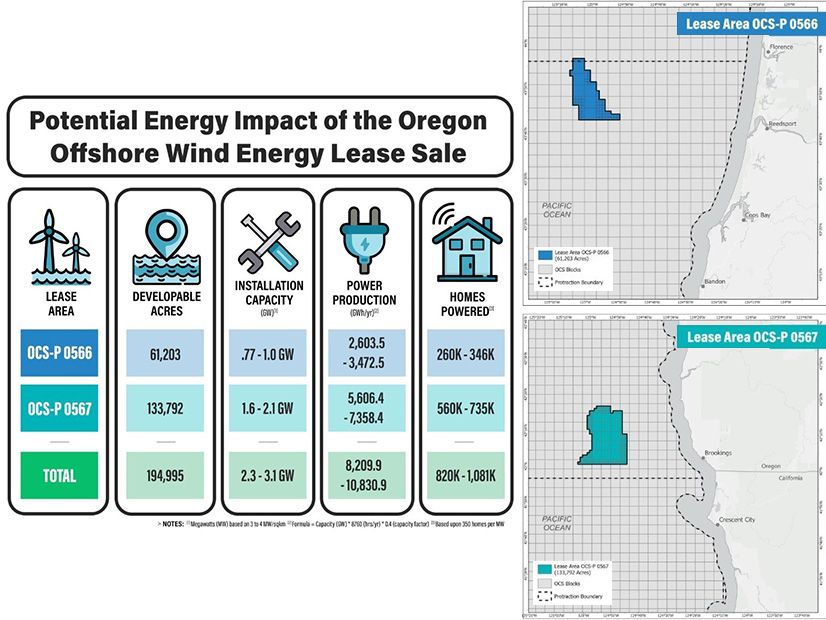
The U.S. Bureau of Ocean Energy Management has postponed its Oct. 15 Oregon offshore wind energy auction due to limited commercial interest.
The move marks the second scratch out of the four auctions BOEM had scheduled in 2024 — the Gulf of Mexico auction targeted for September also was called off, also due to lack of competitive interest.
BOEM canceled the Gulf sale outright but held out the possibility that the Oregon sale could go forward in the future.
Five companies had been qualified to participate in the auction of two lease areas off the Oregon coast, but only one submitted bidding interest.
The Oregon plan stands out as particularly controversial amid the growing pains and opposition facing the offshore wind industry in the United States as the Biden administration and some states try to build a new emissions-free power sector.
BOEM’s plans for Oregon met with the familiar concerns voiced by the fishing industry, but it also drew a federal lawsuit from tribal nations trying to block the auction and a plea from the state’s Democratic governor to pause the initiative.
Gov. Tina Kotek wrote to BOEM Director Elizabeth Klein asking that BOEM halt all leasing activities off the Oregon coast and terminate the auction.
Kotek in her Sept. 27 letter said Oregon would withdraw from the BOEM Oregon Intergovernmental Renewable Energy Task Force to ensure the state’s interests are protected and to be certain there is adequate time to complete the state’s road map.
She expressed disappointment in BOEM’s “accelerated process” over the past year and said she remains convinced offshore wind holds exciting promise for the nation’s clean energy future. But if it is built in Oregon, Kotek said, it would have to be done “the Oregon way.”
BOEM in its Sept. 27 postponement announcement did not allude to the opposition. It emphasized that the auction was the result of engagement with the task force, including coordination with the state government, and said it would continue to collaborate as it determined the prospects of rescheduling the auction.
Offshore wind power development has been a signature initiative of the Biden administration; all 10 of the BOEM project approvals have come in the past 40 months.
This initiative has run up against sharp increases in the already-high cost of construction, shortcomings in the infrastructure and ecosystem needed to support the endeavor, project delays and cancellations, and extensive pushback from people who do not want to look at massive wind turbines or who fear their impact on the sea and its ecology.
The Confederated Tribes of the Coos, Lower Umpqua and Siuslaw Indians sued BOEM in federal court Sept. 16, seeking to halt the auction. They praised BOEM’s Sept. 27 decision, saying they would reconsider their lawsuit and would engage with the state and federal governments to ensure tribal interests were addressed before future lease sales were considered.
The Midwater Trawlers Cooperative said Oregon’s seafood industry, tribes and coastal communities were breathing a “sigh of relief” over the “welcome news.”
The BlueGreen Alliance also applauded BOEM’s decision, explaining that offshore wind is a potentially critical tool for the state to meet its 100% clean energy goals by 2040 but that creating the infrastructure needed to support it would take time.
Oceantic Network supported BOEM’s decision, saying it would allow time for technologies and supply chains to develop and saying it was confident Oregon soon would join other states in the embrace of offshore wind.
The organizations’ choice of words aligned squarely with their positions: BlueGreen and Oceantic said the auction was “paused” and “delayed,” respectively, while the tribes and fishers said it was “canceled.”
Any wind farms built in the two Oregon lease areas would need to employ floating turbines, a further complicating factor. While the fixed-bottom towers being installed in shallower waters along the Northeast coast benefit from a 30-year history worldwide, floating towers are only now beginning to be deployed at scale in areas too deep for fixed-bottom technology.
BOEM had planned four auctions this year: Central Atlantic, Gulf of Maine, Gulf of Mexico and Oregon.
Only one company expressed in interest in participating in the Gulf of Mexico auction. (See BOEM Cancels Gulf of Mexico Wind Lease Auction.)
Seventeen entities were deemed legally, technically and financially qualified to bid in the Aug. 14 Central Atlantic Auction; six submitted bids for two leases areas. (See Dominion and Equinor Win OSW Lease Auction.)
Fourteen entities are deemed qualified to participate in the Gulf of Maine auction, which is scheduled for Oct. 29. (See BOEM Announces Gulf of Maine Offshore Wind Lease Sale.)



